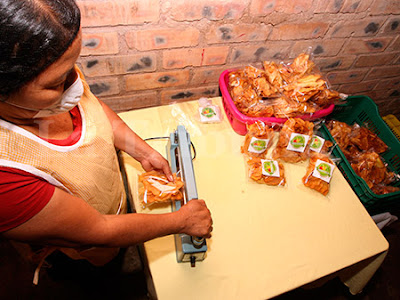Thomson Reuters Foundation
ISHUATAN, El Salvador (Thomson Reuters Foundation) – In this small town, deep in the hills of El Salvador, farmers have become increasingly worried over the last five years as they see their crops of corn, beans and vegetables affected by heavy storms, droughts and hot spells.
To ease the problem, they are going back to school, to learn how to use indigenous agriculture to protect their livelihoods from climate change.
 |
| Corn damaged by heavy rains |
Pablo Perez, a 45-year-old farmer in Ishuatan, a small town 50 km (30 miles) west of San Salvador, said new kinds of fungus and pests in his crop are just one of his worries as the weather shifts.
“We are seeing that the effects of climate change are stronger, not only with drought, but pests are proliferating too,” he said.
Maria de los Angeles, a farmer and mother of three, belongs to a women’s farming cooperative in Ishuatan that has adopted traditional approaches to farming, including the use of native seeds and organic fertiliser. These are promoted by the Salvadoran Ecological Unit (UNES), a non-governmental organisation that has opened schools to teach indigenous agriculture in the west of the country.
De los Angeles explained that traditional farming practices are more economical and healthy, even though the yields are not large.
NOT ‘KILLING THE EARTH’
“Two years ago, I started working with organic (crops) and I feel better, because we spend less money because we do it ourselves. Before we were killing the earth,” she said.
Climate-related problems are not troubling only small-scale producers. A severe infestation of roya fungus has affected many hectares of coffee plantations, reducing production of one of the region’s principal agricultural products.
Last year, the blight hit each of Central America's coffee-producing nations and Mexico, home to about 20 percent of the world's arabica coffee production.
The World Food Programme has distributed food this year to small-scale coffee farmers who have lost their crops because of the fungus.
Floods, storms, landslides and mudslides, as well as droughts, are hitting the region more frequently, according to a report by the United Nations Economic Commission for Latin America and the Caribbean (ECLAC).
In El Salvador, the smallest country in Central America, temperatures have risen by 1.3 degrees Celsius over the last six decades, and experts believe that a further increase of 2 to 3 degrees is likely over the next century.
According to Germanwatch, an environmental organization, El Salvador ranks fourth among the world’s countries for vulnerability to climate change.
The ministry of environment and natural resources says that changes in rainfall patterns have serious implications for water availability, agriculture and food security.
The ministry is implementing a national climate change strategy to promote the restoration of important ecosystems and rural landscapes in areas affected by climate change.
“This programme seeks to establish farming systems (that are) more resilient to climate (change) and biodiversity-friendly, through the expansion of agroforestry, soil and water conservation,” the ministry said.
The government is investing $31.4 million in projects to revive and modernise the agricultural sector by strengthening food security, boosting innovation and improving links with industry and commerce.
ANCESTRAL PRACTICES
But farmers are looking to older approaches, too. Over the past three years, UNES schools have educated 100 Salvadoran farmers in traditional cultivation practices used by their ancestors, the Nahuat-Pipil indigenous people.
Mercedes Palacios, UNES’s specialist for weather, energy and food sovereignty, explained that the schools teach the use of native seeds, care of the earth with organic fertiliser, and the exchange of seeds between farmers.
“Each producer who learns this practice must replicate it in his community. So the more people know about it, the more people become interested in it,” said Palacios.
Amadeo Martinez, head of the Indigenous Council of Central America (CICA), said ancient people understood their environment, the weather and the best growing seasons.
The Nahuat-Pipil used natural fertilizers and pesticides to protect plants without damaging crops, and tended the forests and river basins because the ecosystems helped preserve the life of the community.
“Beyond planting, indigenous practices in agriculture are related to a spiritual relationship with the earth,” said Martinez.
Learning about traditional agriculture has its festive aspects too. During the ceremony at which seeds of different plants are exchanged among farmers, farmers sing ecocorridos (ranchera music with ecological themes) and share their experiences during the previous harvest, while eating corn, beans and fruit.
“Before we had lost this practice, but today we are recovering it,” said Maria de los Angeles. “This is ours.”
Nelson Renteria is a journalist based in San Salvador.




